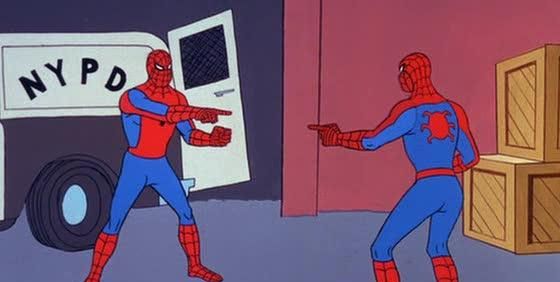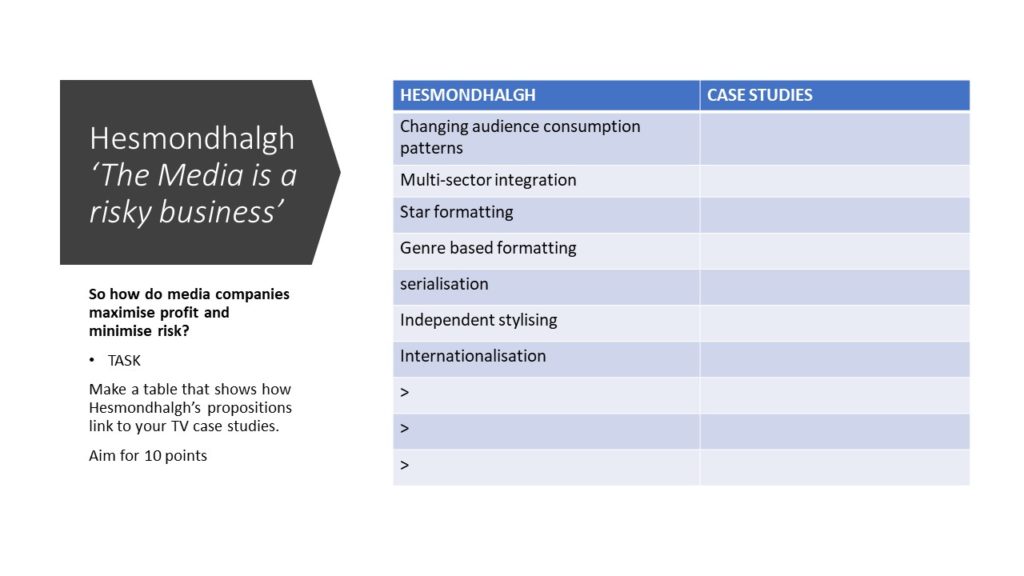- Read the Hesmondhalgh H/O
- Fill in the table on Hesmondhalgh
- Read the Livingstone and Lunt H/O (think about the 3 questions)
Q: What is the difference between a consumer based media regulation system and a citizen based regulation system?
Consumer oriented regulation encourages media plurality and diversity. It is designed to offer a broad range of content, ideas, opinions and icons to its audiences. On the other hand, a citizen based regulation system focuses on the continuity of accuracy and that programmes deal with issues in a fair and objective manner. Civic-minded media providers also ensure not only to entertain their audiences but also to inform and educate them.
Consumer based – content produced FOR the audiences. Media makers are given a lot of freedom to make media that audiences want to consume.
Citizen-based regulation – where media producers make content that contributes to social and cultural health of the societies in which they operate.
What impact according to Livingston and Lunt did the 2003 Communications Act have on media regulation –
- Promoted independent television production by requiring the BBC and Channel 4 to commission more content from smaller production companies.
- Although this led to the production of content and media that was more commercially viable, it also resulted in the production of programming that lacks civic-minded interest or republicanism.
- Communications Act introduced OFCOM, OFCOM tried to ensure that independent media organisations didn’t dominate (good). e.g Capital was produced by the BBC and Kudos. However, Kudos is owned by Endemol and another large conglomerate. In reality Kudos isn’t a small company and is part of a larger structure.
Q. What is the drawback of a self-regulated system?
It doesn’t work.

Less government control means that media organisations are mostly free to create their own ‘codes of conduct’ which can vary drastically. Self-regulation is reliable as companies are unlikely to ‘own-up’ to something that may be deemed offensive by some. Neo-liberalist culture.
Q. How do you regulate media content and organisations on a global scale?
You don’t.
One way to regulate media is to regulate technology alongside media as technology currently cannot be regulated.

| Hesmondhalgh | Capital | Deutschland 83 |
| Changing audience consumption patterns | The representation of multiple identities, cultures and people of different socio-economic statuses will allow for a broad demographic composed of multiple different people to relate or be interested/ attracted to the show. The show incorporates features of multiple genres such as crime, mystery but also contains some elements of humour. | (It is a co-production of AMC Networks’ SundanceTV and RTL Television by the production company, UFA Fiction, with international distribution by RTL Group’s FremantleMedia International and North American distribution by Kino Lorber). As the show was originally aired in America, the audience consumption pattern may be diverted to more foreign produced or related shows. |
| Multi-Sector Integration | Kudos Film & Television Company. Kudos was Formed in 1992, since 2007 it has been part of the Shine Group. In 2007 it also set up the film unit, Kudos Pictures. In 2011, the Shine Group was 100% acquired by News Corporation[1] and was part of the 50-50 joint-venture Endemol Shine Group. On 3 July 2020, France-based Banijay Group bought the studio through former’s acquisition of Endemol Shine Group. It has produced television series for the BBC, ITV, Channel 4, Sky, Amazon and Netflix | UFA Fiction was created through the merger of the UFA subsidiaries teamWorx, Phoenix Film and UFA Fernsehproduktion in the context of a restructuring of UFA and the strategic goal to bundle all companies under one brand in the future. AMC Networks Inc. is an American entertainment company headquartered, Deutschland 83 is a co-production of AMC Networks’ SundanceTV and RTL Television. AMC operates the cable channels AMC (its eponymous brand), IFC, We TV, BBC America (through a joint venture with BBC Studios), and SundanceTV; the art house movie theater IFC Center in New York City; the independent film companies IFC Films and RLJE Films; and premium streaming services Sundance Now and Shudder. In addition, the company operates AMC Networks International, its global division. |
| Star formatting | Toby Jones is a fairly well know British actor, appearing in productions such as Captin America, Harry Potter and the Hunger Games. Therefore, with him as one of the main characters in Capital, with an already developed following and reputation, many would be attracted to watch the show initially because he is in it. | Jonas Nay ([ˈjoːnas naɪ], born 20 September 1990) is a German actor and musician known for starring as Martin Rauch in Deutschland 83, the first German-language TV series shown on American television, and its sequels, Deutschland 86 and Deutschland 89. As this show first aired in America, many viewers many have been persuaded to watch some of the other shows or films the actor has appeared in. |
| Genre based formatting | Labelled as – Crime Drama and Social Realism | Labelled as – Drama, Romance, Thriller |
| Serialisation | Capital is a three-part British television adaptation of John Lanchester’s novel Capital. Those who were fans of the original novel means that the show already has some form of audience, even prior to its production and release on the adaption. | The Sequals to Deutschland 83 are Deutschland 86 and 89, via these latter productions, an audience has already been created therefore, limiting advertisement costs whilst increasing profits through consumers. |
| Independent Stylising | For Capital, however, there is a less noticeable aesthetic due to broad range of characters. However, one common theme aside from the postcards, would be the cinematography and how the camera or audience is positioned multiple times behind characters, appearing to follow them, linking to the people or person who keeps sending the postcards | Deliberately shoes multiple non-stream aesthetics as the show is based in the 80s. There are two key aesthetic used to distinguish between the capitalist West, and Socialist East. Positive representation of German culture despite prejudices that may have been held due to WW2. |
| Internationalisation | Endemol Shine Group B.V. is a production and distribution company. The show was originally commissioned for the BBC however, it is now available to purchase and watch globally on sites such as Acorn TV via Amazon Prime TV. | This show was originally screen in America by the production company UFA fiction. The show was later distributed by the companies FremantleMedia International Kino Lorber In Germany, Deutschland 83 began to air after the U.S. run on RTL 26 November 2015.[77] There, the series lost viewers over the course of its run; the series finale had 1.72 million viewers, or approximately half of the series premiere’s viewers. As a result, German newspaper Bild called the show “the flop of the year”.[65] It premiered in Ireland on 29 November 2015, on RTÉ2.[78] All episodes were added to Australian streaming service Stan in December 2015.[79] On 14 January 2016, the series was made available for streaming in The Netherlands via Videoland.[80] It premiered on Channel 4 in the United Kingdom on 3 January 2016, with the final two episodes shown back-to-back on 14 February. It has since become the most popular foreign-language drama in the history of British television with an audience of 2.5 million viewers as of January 2016.[81] The series was aired for Iran, Afghanistan and Tajikistan by BBC Persian in October 2017. |
